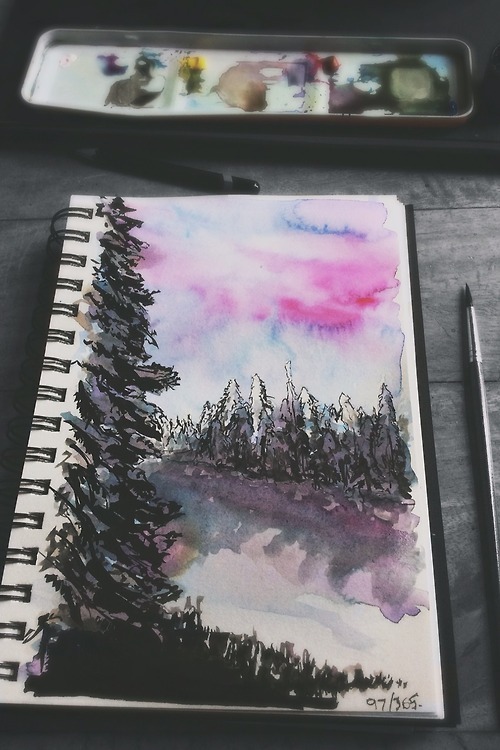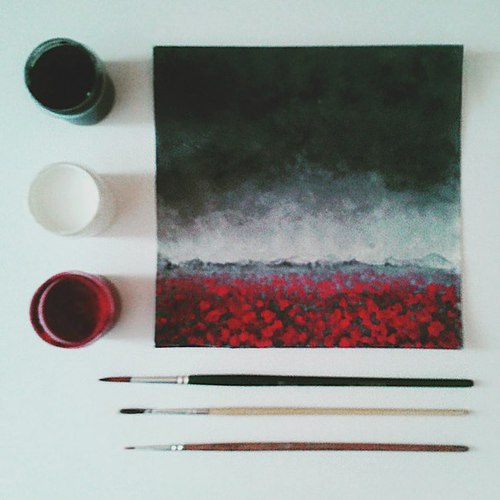Text
shocked
“’Why’d you do that!’ Syd yelled. He knelt beside his friend, wrapped Egan in his arms. The boy wheezed and tried to gulp in air. His lux clothes from the club were soaked in blood.
‘I’m sorry.’ Syd said to him, cradling his head. ‘Don’t die. Just don’t die.’
Egan died.
Just like that.
Syd looked at his friend for a long time. The only sound was the fire crackling, the pop and hiss of the burning scrap wood, charred fragments from the desert floor. Syd’s world had just shrunk to the space in front of him; he couldn’t look beyond it, couldn’t take his eyes from Egan’s face. The mischievous light behind the eyes was gone.”
- Proxy (227)
Syd’s immediate reaction to Egan’s death isn’t anger, nor outright sorrow; the passage provides vivid imagery of the scene without Syd’s commentary in a way that implies Syd is too shocked to absorb the gravity of Egan’s murder as it occurs in all its gruesome horror. The short, simple, and redundant sentences after Egan takes his last breath show Syd’s disbelief and inability to process the death of his best friend. Most specifically, the sentence “Syd’s world ... from Egan’s face” directly tells the audience that Syd is so shaken by Egan’s murder that he can’t even think of anything beyond the hard fact that Egan has passed.
0 notes
Text
wistful
“But our love it was stronger by far than the love
Of those who were older than we—
Of many far wiser than we—
And neither the angels in Heaven above
Nor the demons down under the sea
Can ever dissever my soul from the soul
Of the beautiful Annabel Lee;
For the moon never beams, without bringing me dreams
Of the beautiful Annabel Lee;
And the stars never rise, but I feel the bright eyes
Of the beautiful Annabel Lee;
And so, all the night-tide, I lie down by the side
Of my darling—my darling—my life and my bride,
In her sepulchre there by the sea—
In her tomb by the sounding sea.”
- Poe’s Annabel Lee (1849)
The repetition of the sentence, “Of the beautiful Annabel Lee”, the use of past tense, and the metaphors comparing Annabel Lee and the night sky all convey the narrator’s wistfulness towards his late love. The repetition of her beauty and name shows that he cannot forget about her nor how he felt about her, and thus regrets the atrocities committed against her by her people (stated earlier in poem). The way he associates her with features of the night sky (seen when he compares her memory to moonlight and her eyes to stars, and lays beside her during the night-tide) is significant in that it shows that his longing memory of her is as largely unchangeable and great as the existence of the night. Finally, the last two lines clarify and repeat the fact that Annabel Lee has passed, as if the narrator is still forcing himself to acknowledge and accept it.
0 notes
Text
exuberant
“Still his heart was beating; but I smiled as I felt that success was near. For many minutes that heart continued to beat; but at last the beating stopped. The old man was dead. I took away the bedcovers and held my ear over his heart. There was no sound. Yes. He was dead! Dead as a stone. His eye would trouble me no more!” (Poe 66)
With the out of place smile, shortened sentences, and use of exclamation points, the narrator is clearly exuberant in his moment of freedom. The fact that he smiles even as he deliberately stops the elderly man’s heart- because he stops the elderly man’s heart- shows just how much he’s relishing ridding himself of the “vulture eye”. When the heartbeats stop, the narrator’s sentences shorten in his exuberance and he announces the old man’s death, assuring himself that he will never again be troubled by the old man’s eye; Both of these conclusions end with an exclamation mark showing his internal excitement.
0 notes
Text
hysterical
“This dread was not exactly a dread of physical evil— and yet I should be at a loss how otherwise to define it. I am almost ashamed to own—yes, even in this felon’s cell, I am almost ashamed to own—that the terror and horror with which the animal inspired me, had been heightened by one of the merest chimeras it would be possible to conceive. My wife had called my attention, more than once, to the character of the mark of white hair, of which I have spoken, and which constituted the sole visible difference between the strange beast and the one I had destroyed. The reader will remember that this mark, although large, had been originally very indefinite; but, by slow degrees—degrees nearly imperceptible, and which for a long time my reason struggled to reject as fanciful—it had, at length, assumed a rigorous distinctness of outline. It was now the representation of an object that I shudder to name—and for this, above all, I loathed, and dreaded, and would have rid myself of the monster had I dared—it was now, I say, the image of a hideous—of a ghastly thing—of the GALLOWS!— oh, mournful and terrible engine of Horror and of Crime—of Agony and of Death !” (Poe 10)
This excerpt from Poe’s The Black Cat delivers a mounting sense of hysteria through its increasingly macabre descriptors, the way the sentences turn from a storytelling style to a listing of conclusions and feelings the narrator jumps to, and its use of excessive capitalization and punctuation. In the beginning of the passage Poe tells the reader that his loathing of the new cat has developed into a deepseated fear, but as he starts to explain why/when this happened(the emergence of the gallows symbol upon the cat’s chest), his sentences devolve into a list of grim and gruesome descriptors of the gallows symbol. The sentences lose their structure as the narrator loses his composure. Meanwhile, the capitalization of certain words and phrases such as “GALLOWS” and “of Horror and of Crime” lends intensity and a frenzied gravity to these thoughts. Lastly, the abundance of em dashes and exclamation points create dramatic pauses and illustrate the narrator's growingly jumbled and jarring perception of the cat.
0 notes
Text
impartial
“Professor Dumbledore was now looking down at Harry, who looked right back at him, trying to discern the expression of the eyes behind the half-moon spectacles.
‘Did you put your name into the Goblet of Fire, Harry?’ he asked calmly.
‘No,’ said Harry. He was very aware of everybody watching him closely. Snape made a soft noise of impatient disbelief in the shadows.
‘Did you ask an older student to put it into the Goblet of Fire for you?’ said Professor Dumbledore, ignoring Snape.
‘No,’ said Harry vehemently.
‘Ah, but of course ’e is lying!’ cried Madame Maxime. Snape was now shaking his head, his lip curling.
‘He could not have crossed the Age Line,’ said Professor McGonagall sharply. ‘I am sure we are all agreed on that —’
‘Dumbly-dorr must ’ave made a mistake wiz ze line,’ said Madame Maxime, shrugging.
‘It is possible, of course,’ said Dumbledore politely.”
- Harry Potter and the Goblet of Fire (276)
The simplicity of the questions and the words “calmly” and “politely” give a sense of impartiality to Dumbledore’s inquiry, as do Dumbledore’s written interactions with the other teachers. Despite every other teacher condemning Harry and/or Dumbledore’s spellwork, none of Dumbledore’s questions are framed in a biased manner. The text directly supports this, as when Dumbledore asks Harry if he had an older student enter his name, it is stated that Dumbledore ignores Snape’s accusatory noises, but he also acknowledges Lady Maxime’s fear that Harry found a way around the Age Line rather than simply dismissing it in favor of Harry.
0 notes
Text
threatening
INT. ROOM
Harry is in a room with the other champions. Dumbledore bursts in and grabs Harry.
DUMBLEDORE
Harry! Did you put your name in the goblet of fire?!
HARRY
No sir.
DUMBLEDORE
Did you ask one of the older students to do it for you?
HARRY
No sir.
DUMBLEDORE
You’re absolutely sure?
HARRY
Yes sir.
-Harry Potter and the Goblet of Fire (2005)
The tone of this passage is very clearly threatening specifically on the part of Dumbledore. While the scene starts out relatively calm with Harry and the other contestants standing in a room, Dumbledore bursting in elicits a feeling of shock and fear. This feeling continues as it is clear, even without a visual, that because Dumbledore has grabbed Harry, he’s essentially yelling in his face. Despite this passage being very barebones in terms of content, it’s still apparent the tone is threatening based on Dumbledore’s actions toward Harry. While he isn’t directly threatening Harry, his behavior can be interpreted as such, especially to the person he’s yelling at.
1 note
·
View note
Text
contemptuous
His eyes flared. "Ares is a fool. He never realized the true master he was serving. If I had time, Percy, I could explain. But I'm afraid you won't live that long."
He crumpled his Coke can and threw into the creek, which really shocked me. One of the first things you learn at Camp Half-Blood is: Don't litter. You'll hear from the nymphs and the naiads. They'll get even. You'll crawl into bed one night and find your sheets filled with centipedes and mud.
"The heck with laurel wreaths," Luke said. "I'm not going to end up like those dusty trophies in the Big House attic."
"You make it sound like you're leaving."
Luke gave me a twisted smile. "Oh, I'm leaving, all right, Percy. I brought you down here to say good-bye."
He snapped his fingers. A small fire burned a hole in the ground at my feet. Out crawled something glistening black, about the size of my hand. A scorpion.
I started to go for my pen.
"I wouldn't," Luke cautioned. "Pit scorpions can jump up to fifteen feet. Its stinger can pierce right through your clothes. You'll be dead in sixty seconds."
"Luke, what—"
Then it hit me.
You will be betrayed by one who calls you a friend.
"You," I said.
He stood calmly and brushed off his jeans.
The scorpion paid him no attention. It kept its beady black eyes on me, clamping its pincers as it crawled onto my shoe.
"I saw a lot out there in the world, Percy," Luke said. "Didn't you feel it—the darkness gathering, the monsters growing stronger? Didn't you realize how useless it all is? All the heroics—being pawns of the gods. They should've been overthrown thousands of years ago, but they've hung on, thanks to us half-bloods."
I couldn't believe this was happening.
"Luke ... you're talking about our parents," I said.
He laughed. "That's supposed to make me love them? Their precious 'Western civilization is a disease, Percy. It's killing the world. The only way to stop it is to burn it to the ground, start over with something more honest."
"You're as crazy as Ares."
-The Lightning Thief, Rick Riordan (2006)
This passage conveys a tone of contempt through the character Luke as he reveals his true self to the book’s protagonist, Percy. The first hint of contempt is shown when Luke throws his can into the water despite knowing the consequences of his actions. He demonstrates that he doesn’t care for the rules of the camp or of the spirits living there, presumably because he sees himself as better than them. The rest of Luke’s contempt is presented when Percy says, “Luke...you’re talking about our parents,” and Luke coldy dismisses that fact with “That’s supposed to make me love them?” and then goes on to berate the “Western Civilization” that the gods have created. Not only does he hate the gods (and therefore his father), he doesn’t respect them as parents or as the creators of civilization as we know it. The combination of these things give this passage a contemptuous tone.
0 notes
Text
ecstatic
“I need to see the generator,” Doon said. “I have . . . I have ideas about it.” He thrust his hands into his pockets. “So,” he said, “will you trade?”
“Yes!” cried Lina. “Messenger is the job I want most!” And not a useless job at all, in her opinion. People couldn’t be expected to trudge halfway across the city every time they wanted to communicate with someone. Messengers connected everyone to everyone else. Anyway, whether it was important or not, the job of messenger just happened to be perfect for Lina. She loved to run. She could run forever. And she loved exploring every nook and cranny of the city, which was what a messenger got to do.
“All right then,” said Doon. He handed her his crumpled piece of paper, which he must have retrieved from the floor. Lina reached into her pocket, pulled out her slip of paper, and handed it to him.
“Thank you,” he said.
“You’re welcome,” said Lina. Happiness sprang up in her, and happiness always made her want to run. She took the steps three at a time and sped down Broad Street toward home.
-The City of Ember, Jeanne DuPrau (2003)
While it’d be obvious to say that there is a tone of happiness in this passage, the writing takes the emotion much further than that. Firstly, Lina crying out that she wanted to be a messenger is indicative of how much she really wanted the job. Then she goes on to describe not only how important the job of messenger is, but how much she loves doing things that are required for the job anyway. The sentences describing those things are very concise ways that make Lina’s thoughts seem very rapid and excited about the job of messenger. There is also the use of the phrase “happiness sprung up in her” in regards to Lina, which proves that she is ecstatic about getting what she wants.
0 notes
Text
informative
Third Subject’s Responses to Investigator’s Written Questionnaire.) EYES ONLY.
1. Jemima Glorfindel Petula Ramsey.
2. Seventeen on June the ninth.
3. The last five years. Before that we lived in Glasgow (Scotland). Before that, Cardiff (Wales).
4. I don’t know. I think he’s in magazine publishing now. He doesn’t talk to us anymore. The divorce was pretty bad and Mum wound up paying him a lot of money. Which seems sort of wrong to me. But maybe it was worth it just to get shot of him.
5. An inventor and entrepreneur. She invented the Stuffed Muffin, and started the Stuffed Muffin chain. I used to like them when I was a kid, but you can get kind of sick of Stuffed Muffins for every meal, especially because Mum used us as guinea pigs. The Complete Turkey Christmas Dinner Stuffed Muffin was the worst. But she sold out her interest in the Stuffed Muffin chain about five years ago, to start work on My Mum’s Colored Bubbles (not actually TM yet).
6. Two. My sister Nerys, who was just fifteen, and my brother Pryderi, twelve.
7. Several times a day.
8. No.
9. Through the Internet. Probably on eBay.
10.She’s been buying colors and dyes from all over the word ever since she decided that the world was crying out for brightly colored Day-Glo bubbles. The kind you can blow, with bubble mixture.
11. It’s not really a laboratory. I mean, she calls it that, but really it’s just the garage. Only she took some of the Stuffed Muffins money and converted it, so it has sinks and bathtubs and Bunsen burners and things, and tiles on the walls and the floor to make it easier to clean.
-Orange, Neil Gaiman (2008)
In this passage, a girl named Jemima is answering a series of unknown questions about an incident that had to do with a member of her family. Despite the author of the story not revealing what the questions Jemima is answering are, it is fairly simple for the author to figure out what is being asked of her due to her informative tone. Jemima answers the questions very clearly, and instead of giving yes, no, or short answers, she adds extra information that helps the reader understand what is happening. She goes into detail about things that the person asking might not necessarily need to know, like that she thinks it’s unfair that her mother ended up paying her father a lot of money in their divorce. However, this extra information helps the reader further understand 1) what is being asked of Jemima and 2) who she is as a person.
0 notes
Text
ominous
I was about to hurl it at Thalia when I saw something in the woods. I lost my anger and my concentration all at once. The water splashed back into the creekbed. Thalia was so surprised she turned to see what I was looking at.
Someone… something was approaching. It was shrouded in a murky green mist, but as it got closer, the campers and Hunters gasped.
“This is impossible,” Chiron said. I’d never heard him sound so nervous. “It… she has never left the attic. Never.”
And yet, the withered mummy that held the Oracle shuffled forward until she stood in the center of the group. Mist curled around our feet, turning the snow a sickly shade of green.
None of us dared move. Then her voice hissed inside my head. Apparently everyone could hear it, because several clutched their hands over the ears.
I am the spirit of Delphi, the voice said. Speaker of the prophecies of Phoebus Apollo, slayer of the mighty Python.
The Oracle regarded me with its cold, dead eyes. Then she turned unmistakably toward Zoe Nightshade. Approach, Seeker, and ask.
Zoe swallowed. “What must I do to help my goddess?”
The Oracle’s mouth opened, and green mist poured out. I saw the vague image of a mountain, and a girl standing at the barren peak. It was Artemis, but she was wrapped in chains, fettered to the rocks. She was kneeling, her hands raised as if to fend off an attacker, and it looked like she was in pain. The Oracle spoke:
Five shall go west to the goddess in chains,
One shall be lost in the land without rain,
The bane of Olympus shows the trail,
Campers and Hunters combined prevail,
The Titan’s curse must one withstand,
And one shall perish by a parent’s hand.
Then, as we were watching, the mist swirled and retreated like a great green serpent into the mummy’s mouth. The Oracle sat down on a rock and became as still as she’d been in the attic, as if she might sit by this creek for a hundred years.
-The Titan’s Curse, Rick Riordan (2007)
The tone of this passage is ominous for many reasons. One is the use of ellipses in the beginning of the passage, in description as well as dialogue. In the description, they help convey a sense of uncertainty in the situation. The ellipses in Chiron’s dialogue further indicate his nervousness at what's happening in the scene, as does his use of “Never” at the end of his dialogue that implies his uneasiness. The description of “[the] mist curl[ing] around our feet, turning the snow a sickly shade of green” is also there to add to the unease of the situation, specifically in the use of the word sickly. More unease is shown when Zoe “swallows” before speaking to the Oracle as if she is nervous about what's happening. It is overall nervousness in the characters’s actions and dialogue, as well as in the description that give this scene and ominous tone.
0 notes
Photo


a search for spring
Angeles National Forest, California
instagram
25K notes
·
View notes






